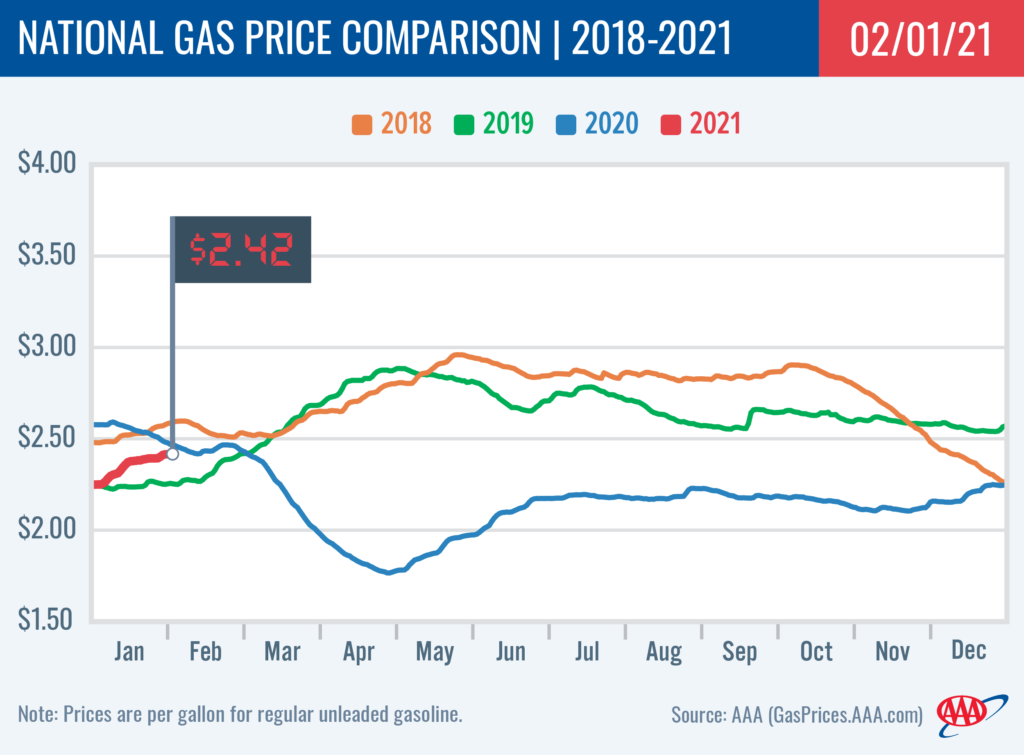National Gas Price Average Soon to be More Expensive than a Year Ago
WASHINGTON, D.C. — The national gas price average has been cheaper year-over-year for 336 days—as much as $1.12/gallon less. However, AAA predicts that trend will end as early as this week. At $2.42, the national average is only a nickel cheaper than a year ago.
“For nearly a year, motorists have been saving 53 cents a gallon, on average, when filling up their gas tanks. That extra pocket change is quickly going to dwindle thanks to rising crude oil prices that have made for more expensive pump prices,” said Jeanette Casselano McGee, AAA spokesperson.
Ten states are already carrying more expensive gas prices compared to a year ago, including: Delaware (+23 cents), Maryland (+9 cents), Iowa (+6 cents) and Indiana (+6 cents). On the other side of the coin, nearly 12 states still have gas price averages that are as much as 38 cents a gallon less than this time last year.
While cheaper year-over-year, the national average increased by two cents on the week and is now 17 cents more expensive than last month. The national average continued to climb this past week despite a drop in gasoline demand and refinery utilization. According to the latest Energy Information Administration (EIA) measurements, demand declined from 8.11 million b/d to 7.83 million b/d and total refinery utilization decreased from 82.5 percent to 81.7 percent over last week. These decreases led to an increase in gasoline supply of 2.4 million bbl.
Typically, these factors (decrease in demand, increase in supply) drive a decrease at the pump, but sustained crude oil prices are pushing the increase. For three weeks, crude continues to price between $52–$53/bbl, steady price points not seen since mid-February 2020. Gas prices are expected to continue to increase as crude oil prices remain at these price points.

Quick Stats
- The nation’s top 10 largest weekly increases: Michigan (+12 cents), Indiana (+10 cents), North Carolina (+8 cents), Idaho (+5 cents), Illinois (+5 cents), Oklahoma (+4 cents), California (+4 cents), Nevada (+4 cents), Tennessee (+4 cents) and Vermont (+3 cents).
- The nation’s top 10 most expensive markets: California ($3.41), Hawaii ($3.32), Washington ($2.83), Nevada ($2.77), Pennsylvania ($2.70), Oregon ($2.69), Washington, D.C. ($2.59), Alaska ($2.59), Illinois ($2.59) and New Jersey ($2.56).
Oil Market Dynamics
At the close of Friday’s formal trading session, WTI decreased by 14 cents to settle at $52.20. Price gains were limited last week by ongoing market concern that crude demand may take more time than expected to recover in 2021 due to new coronavirus infections and associated travel restrictions. However, EIA’s new weekly report prompted crude price increases earlier in the week after it showed total domestic crude inventories declined by 9.9 million bbl to 476.7 million bbl, which is the largest weekly decline since late July 2020. For this week, crude prices may continue to drop if market concern regarding demand continues to grow.
Motorists can find current gas prices along their route with the free AAA Mobile app for iPhone, iPad and Android. The app can also be used to map a route, find discounts, book a hotel and access AAA roadside assistance. Learn more at AAA.com/mobile.
